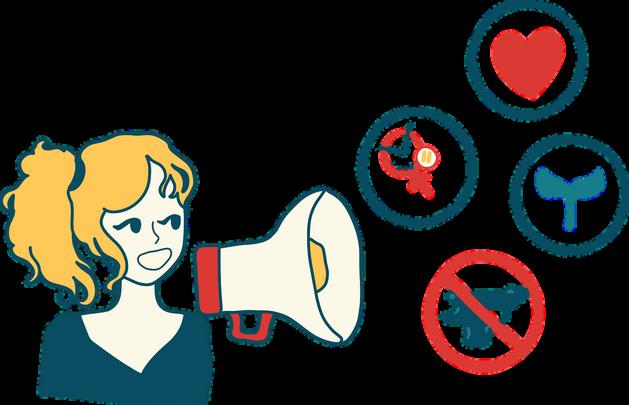
3 minute read
Interview With a Student Activist Interview With a Student Activist
from Vol 2 Issue 1
What is your name, grade, and school you attend?
“Zoë Geller-Alford (she/her), 12th grade, Point Loma High School.”
Advertisement
What issues do you focus on in activism?
“I have experience with reproductive rights, gun control, environmental justice, LGBTQ+ rights, and youth advocacy.”
How did you first get involved in activism? / When did you start getting involved?
“I grew up exposed to climate science since my father is an oceanographer, but I remember feeling truly scared about the climate crisis for the first time in 6th grade, when we surpassed 400 ppm (CO2 composition in our atmosphere). That was seen as a real tipping point, because it takes so long to impact that number. I went to my first youth climate summit through Youth4Climate as a freshman. That was my jumping-off point into climate activism, and everything else was a domino effect from there.”
How long have you been involved in this activism?
“I really got started in 2020, after the pandemic hit. My first exposure was that aforementioned Youth4Climate summit in 2019! Since that first summit, I realized how much of a domino effect my efforts have been, with one leading me to the next.”
Do you want to continue your work in activism throughout college and your career?
“Absolutely, I will always be in activism. I am going into environmental engineering because I hope to contribute a hand in mitigating the climate crisis. I think on a selfish level, I’m involved because I wouldn’t be able to stand all the awful news headlines without feeling like I’m trying to do something I also hope humanity can be about stepping outside of ourselves for the good of one another. I hope what I’m trying to do is along those lines.”
What organizations do you work with?
“I’ve helped with the Eco Club Coalition planning committee, the Youth v. Oil campaign, and my own campaign educating about climate finance and Chase Bank, the biggest funder of fossil fuels! I then connected with Future Coalition and put on my first sololed protest outside of our downtown Chase Bank.
In my school district, I got involved with climate justice through Student Equity Ambassadors, a group locating and remedying areas of injustice. I started by working on the composting system in 2020, and then became co-chair of the Gender Empowerment division. I drafted a genderneutral dress code policy, helped the implementation of AB-367 mandating free period products in school bathrooms, and partnered with a local organization to reduce period stigma in schools. When a student at my school was assaulted and received no support, I helped organize a protest of survivors sharing their stories. I used the district connections I’d formed as an Equity Ambassador to get a meeting with the Superintendent about changing our sexual harassment policy. I founded the Unite Coalition at my school, a group dedicated to resources and system reform to eradicate rape culture. Our Sexual Misconduct Awareness Week hosted guest speakers and focused on our school-wide presentations on terminology, resources, and how to stop being a bystander.” lost the drive that kept me fighting. Yet, I’ve met the most powerful, inspiring people through my work. It reminds me of good in the world, of how we keep hope in face of setbacks, and the power of community I’ve developed such a sense of power and selfadvocacy through what we do. Though it’s a constant reminder of everything that needs fixing in the world, it’s also what keeps me going.”
What is your advice for students who are interested in participating in activism?
“Take advantage of your age!! You have such a unique position as a young person – utilize that. Start at school. What could be made better? What resources do students deserve? There are systems in place that can help you advocate for change at that initial level, and then work your way up to the district for widespread change. This is a perfect way to start, especially since you see tangible change at a school-level. Take your time, don’t overload yourself, and make sure to prioritize your own wellbeing and joy throughout the process. That sounds intuitive, but I overlooked it and it left me so burned out and bitter about everything. You have such power and passion as an individual, and allowing that to thrive should always be the priority.”
What is your favorite and least favorite part of being an activist?
“Sometimes it feels like everything is working towards a goal, and sometimes it feels like putting pressure on a bleeding wound, trying to do anything to make it better. This past summer the strings holding my will together frayed apart and I









